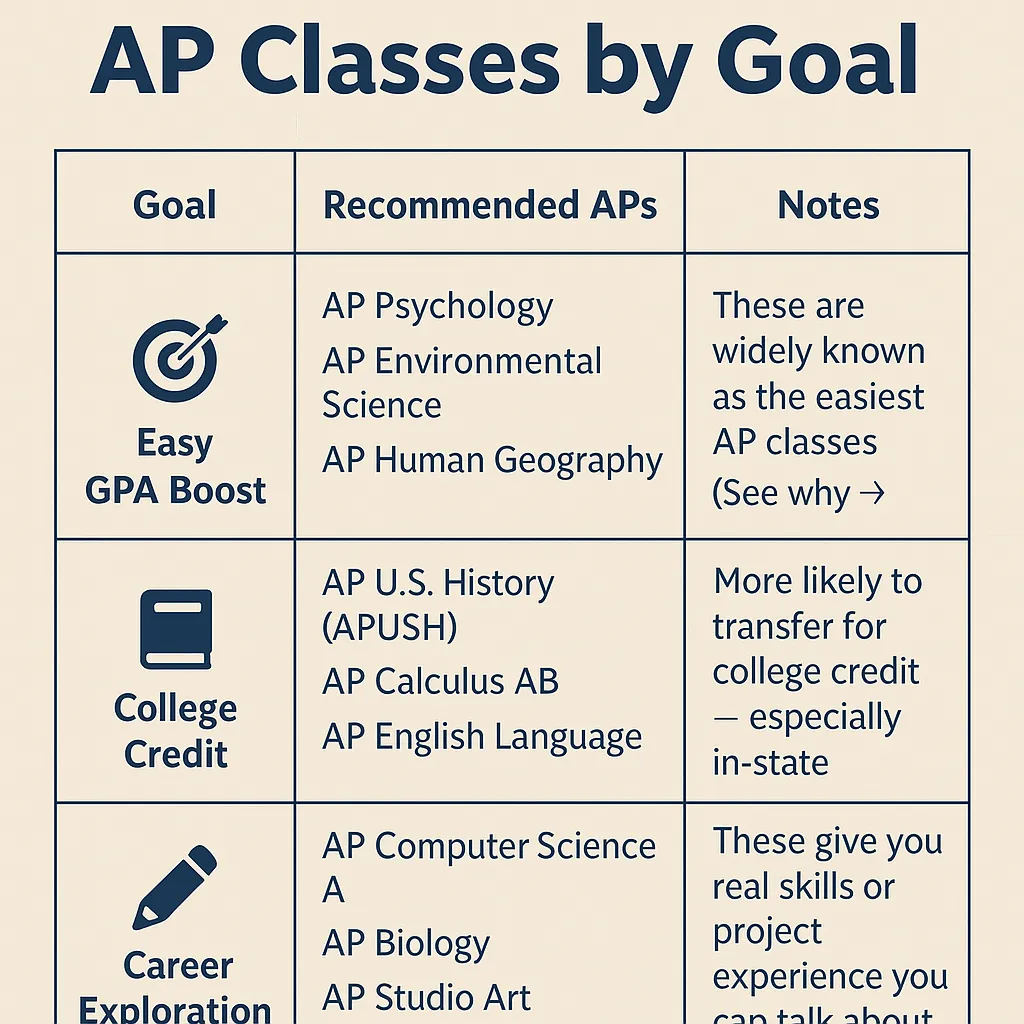Choosing AP classes feels like picking your future. Let’s break it down.
If you’re staring at a long list of AP course options and thinking, “Which ones actually matter?” — you’re not alone. For students, it can feel like a high-stakes puzzle.
For parents, it’s a balancing act between challenge and overwhelm.
Of course, picking the right AP classes is only half the journey — preparing well matters just as much. If you’re looking for structured online prep, check out our guide on Coursera AP Exam Prep Courses.
This guide walks you through what most students and families wish they knew before choosing AP classes.
We’ll break it down by:
- Your goals (college credit? GPA boost? future major?)
- How colleges actually view AP courses
- Real-life Reddit & Quora examples from students who’ve been there
- Smart strategies to build a course plan without burning out
In my opinion, AP planning is less about “hardest classes” and more about smart fit. Here’s what most parents miss: The right APs can unlock scholarship opportunities, college flexibility, and even early graduation — but the wrong ones can tank motivation or GPA.
Before you even pick APs, your PSAT can give a good benchmark — here’s the full PSAT score breakdown
Let’s make sure you pick what’s right for your future.
What Are AP Classes and Why Do They Matter in 2025?
Advanced Placement (AP) classes are college-level courses offered in high schools across the U.S. and internationally.
They’re run by the College Board — the same folks behind the SAT — and they’ve become a major part of how students boost their transcripts and prepare for college.
But in 2025-2026, they’re more than just “extra tough classes.”
Some schools now require you to take an entrance test or meet GPA criteria before enrolling in APs. Others let you self-enroll — but warn you that once you’re in, you’re committed.
Learn more about how AP exams work, scoring systems, and registration in our full AP Exams guide.
How AP Classes Work Today (College Board + School Requirements)
Here’s a quick overview:
- The College Board creates and manages the curriculum and exams
College Board AP Overview - Your school decides who can take APs, how many, and when
- At the end of the year, you’ll take a standardized AP Exam (scored 1–5)
- Colleges may offer credit if you score a 3 or higher (though many top schools want a 4 or 5)
Some students think APs are automatically weighted or boost GPA everywhere — but that depends on your school district’s grading policy.
Pro Tip: Before signing up, ask your school counselor:
“Do AP classes here get a full GPA weight boost, and how many can I take per year?”
If you’re curious which APs matter most depending on your future career path, check out our full guide on AP Classes by Career Path.
The 3 Main Reasons Students Take APs
Most students take APs for one of these three reasons — sometimes all three:
1. To earn college credit
AP classes can save you money and time. If your future college accepts AP scores, you could skip Gen Eds or even graduate early.
- Example: A Reddit user shared how APUSH + AP Lit + AP Psych saved them 12 college credits, shaving off a full semester.
- ➤ Read: Are AP Classes Worth It for College Credit?
2. To boost GPA
At many high schools, APs are weighted — meaning an A in AP Biology counts more than an A in regular Biology. That can lift your class rank and increase your GPA beyond a 4.0.
But be careful — a low grade in an AP could hurt you more than an A in an honors class.
3. To show rigor on college apps
Selective colleges (especially Ivies and top 50 schools) look for students who “challenged themselves.” AP classes signal that you’re ready for college-level work — especially in core academic areas like math, science, and history.
Real Student Insight (Reddit):
“I thought APs were just for GPA padding, but they actually saved me a semester in college.”
Why Do Students Take AP Classes?
Real motivations behind AP course decisions
| Motivation | % Estimate* | Description |
|---|---|---|
| To earn college credit | 45% | Save time and money on general ed classes in college |
| To boost GPA | 30% | Get a weighted GPA boost to improve class rank |
| To look competitive for college | 20% | Show academic rigor for Ivy League or top-tier admissions |
| Peer pressure or expectation | 3% | Took it because “everyone else was doing it” or parents pushed for it |
| Didn’t fully understand it | 2% | Signed up without knowing the workload or impact |
Source: Aggregated from College Board forums, Reddit AP threads, and student interviews.
Many AP-level topics are also on Coursera. You can access them free through Coursera’s Financial Aid program.
Best AP Classes by Goal
Not every AP class is created equal — and that’s actually a good thing. Whether you’re aiming for an easy GPA bump or diving deep into a future career path, the right AP classes depend on your why.
Here’s a breakdown to help you choose based on what matters most to you:

Want to focus only on the APs that actually help you skip classes in college? Here’s our deep dive on the best AP classes for college credit — ranked by transfer value.
Goal #1: “I just want to boost my GPA.”
Honestly? I’d recommend starting here if you’re new to APs or juggling a packed schedule. These are lower-stress courses with high pass rates and light reading loads.
- AP Psychology – Fun, intuitive, and mostly memorization.
- AP Environmental Science – Science-lite, and often described on Reddit as “the chill AP.”
- AP Human Geography – Many 9th/10th graders take this one to ease into APs.
Real user tip from Reddit: “Took AP Psych and APES together junior year — honestly felt like a break compared to honors chem.” (r/APStudents)
Want more low-effort, high-reward options? Check out our guide to the easiest AP classes.
Goal #2: “I want college credit.”
This is where it gets strategic. If you’re hoping to skip gen-ed classes or even graduate early, these APs are usually your best bet:
- AP U.S. History (APUSH) – Often fulfills 3–6 credits at public colleges.
- AP Calculus AB – Accepted at most universities for math credit, depending on your major.
- AP English Language – A 4 or 5 can knock out freshman comp.
College Board Tip: Use this AP Credit Policy Search tool to check how each AP score transfers at different colleges.
🎓 AP Credit Transfer Lookup Tool
Want to know how your AP scores transfer at different colleges? Use the official College Board credit policy search tool:
Some parents overlook this — but earning just two AP credits can save you $3,000–$6,000 in tuition.
Goal #3: “I want to explore a future major or career.”
Some APs give you a hands-on feel for subjects that matter in real life.
- AP Computer Science A – Great intro to Java and real-world coding logic.
- AP Biology – Perfect for pre-med interest, especially if paired with lab work.
- AP Studio Art / AP Art History – Not just for artists — they’re portfolio-based and useful for design, media, and architecture paths.
💬 Quora insight: “I took AP Bio in high school, realized I actually loved genetics. Ended up majoring in biotech.” – Source
If you’re unsure what you want to study, I’d recommend mixing one of these in junior year. It’s like career test-driving — but with college credit.
Next up: Want to know which AP classes are actually the hardest? We break them down.
Some students even double up with advanced Coursera courses designed for AP-level learners.
Best APs by Subject Area (2025 Rankings)
Not all APs are created equal — some impress colleges more, some are GPA-friendly, and others dive deep into your potential major.
Here’s a quick breakdown of top AP classes by subject, ranked by overall usefulness, rigor, and student outcomes.
STEM APs (Science, Tech, Engineering, Math)
1. AP Calculus AB – The gold standard for STEM-bound students. Looks great for engineering, pre-med, or data science majors.
2. AP Biology – College-level depth + strong foundation for pre-med or life sciences.
3. AP Physics C – Calculus-based physics; highly respected but notoriously tough. Only take it if you’ve completed or are co-enrolled in Calc.
Did You Know?
AP Chemistry has one of the lowest pass rates (~54%), but if you’re eyeing a pre-med path, many top colleges expect it.
Humanities APs
1. AP U.S. History (APUSH) – Broad scope, often accepted for core credit. Known for heavy reading but a great intro to analytical writing.
2. AP English Language (AP Lang) – Builds argument-based writing skills useful in almost every college major.
3. AP Psychology – A popular entry-level AP with easier content but surprising depth. Good GPA booster if taken seriously.
Pro Tip:
Colleges often look at AP Lang over AP Lit when evaluating core English readiness.
In my opinion, take Lang first if you’re only doing one.
Arts & Electives
1. AP Art History – Combines history, culture, and critical thinking. Great for visual learners and liberal arts majors.
2. AP Music Theory – Intense, but rewarding for serious musicians or music majors. Includes aural skills and composition.
Reddit Take:
“I took AP Music Theory and it blew my mind. Helped me test out of intro music courses in college.”
Computer Science APs
1. AP Computer Science Principles (AP CSP) – Introductory, project-based. Friendly for beginners and non-STEM majors.
2. AP Computer Science A (AP CSA) – Java programming with rigor. Best for students planning a CS or engineering major.
Heads-up:
CSP is easier but not always accepted for direct credit by CS departments. CSA is harder — but more respected.
Strong PSAT scores can point you toward tougher APs later. See our PSAT 2025 Guide for benchmarks.
FAQs: Quick Answers for Parents & Students
Is it better to take AP or Dual Enrollment?
It depends on your goals.
AP is better if you’re aiming for top schools or nationwide recognition.
Dual Enrollment can be better for guaranteed local college credit.
See full AP vs Dual Enrollment comparison →
Are AP classes worth it for STEM majors?
Yes — especially AP Calculus, AP Physics, and AP Computer Science A.
They strengthen your application and prep you for college-level rigor.
Check the best APs for STEM-bound students →
How many APs do Ivy League schools expect?
There’s no official number, but competitive applicants often take 8–12 APs over high school.
What matters most: rigor + grades + relevance to your major.
Explore AP strategy for Ivy League admissions →
Final Thoughts: What Most Parents Miss About AP Strategy
“We thought AP was about academics. But it’s also about learning how to manage time, stress, and ambition.”
Many families approach APs like a checklist — take the hardest classes, get the best grades, repeat. But there’s a bigger lesson here: APs are practice for life. Students learn to balance priorities, push through pressure, and advocate for themselves — long before they ever step on a college campus.
Feeling anxious about the workload? Here’s how to reduce AP exam stress.
If you’re still deciding which APs make sense for your teen:
- Talk to your school counselor — they know what’s realistic within your school’s structure.
- Use our AP Planning Tools to build a custom course map:
Explore all tools → - Bookmark this page — your AP strategy may shift every semester.
You may also like:
- 👉 AP vs. IB: College Preference & Key Differences
- 👉 How AP Affects Your GPA (+Boosting Tips)
- 👉 Can You Take AP Classes Online? (2025 Guide)
Trust me — it’s not just about the classes. It’s about building a high school experience that leads somewhere you actually want to go.

Nawab, an educator teaching K-12 since 2010, holds an English honors graduate degree and a diploma in elementary education. He has also been blogging for five years, sharing insights for educators and parents.

